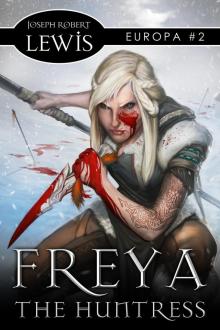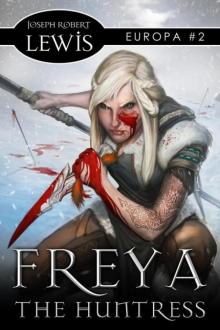- Home
- Joseph Robert Lewis
Europa Page 5
Europa Read online
Page 5
The men were snoring in the back of the cabin, and the women looked to be similarly asleep in the cockpit, so Omar pulled on his gloves and hat, wrapped his coat tightly around himself, and slipped out the hatch as quickly and quietly as he could. There was a sharp stitch in his side and he hoped a long walk would ease his digestion before he tried to sleep sitting up for the third night in a row.
Stepping away from the warmth of the cabin and away from the shadow of the airship, he discovered a world of quiet oblivion. There were no leafy branches or tall waving grasses to shush and whisper in the breeze. There were no owls or nightingales to call, and no crickets to chirp. No wolves howled and no lions roared.
There was nothing between heaven and earth but the ice and the clouds wrapped in perfect silence.
He walked carefully across the frozen ground, placing his boots gently on the icy dust and making only the softest crunching noises. When the Frost Finch was merely a dark shape in the distance behind him, Omar stopped. The clouds were breaking up, revealing more stars and spilling more moonlight on the face of glacier. A pale mist hovered above the ice so thick that it obscured the ground completely, and Omar saw the aether moving slowly toward the south, sliding down the skin of the world toward the jagged peaks of the Pyrenees. He turned to look north, and froze.
My God. Look at them all!
The ghosts marched toward him in a line that stretched from the east to the west as far as he could see. Their fragile forms rippled and fluttered as the last weak breaths of wind danced through the aether mist, gently tugging at the outlines of the dead men and women. They walked slowly, their empty hands hanging at their sides. They did not seem to acknowledge one another, all of them walking just out of reach of those around them, never touching, never speaking, never even looking at each other. The army of the dead marched in stone-faced silence.
Omar stood very still as the wall of ghosts approached him, and when they reached him he took a few steps forward here or backward there to avoid touching them as they passed. But he did study their faces. He saw men and women of all ages, and even a few children in the distance, and all of them bore the sharp noses and thin mouths he had come to associate with the Europan tribes. They wore heavy leather clothes and thick furs, and had small carved bones thrust through their ears and tied into their straw-colored hair.
After a few minutes of watching the silent procession through the aether mist, Omar fell into step beside the shade of a young woman with a large fur hood resting on her insubstantial shoulders.
“Good evening,” he said in Rus.
“Hello.” Her accent was strange, but the word was clear enough.
“Where are you from?”
“My home is called Swansea,” she said. “Is this your homeland?”
Omar glanced at the desolate glacier around them. “No. My home is far to the south and the east, in a land called Aegyptus. It’s much warmer in my homeland than here. Your home in Swansea must be very cold if it’s much farther to the north. Did you die in Swansea?”
The woman nodded. She never looked at him, only at the southern horizon.
“If you don’t mind the question, could you tell me how you died?”
“Reavers.” Her voice was flat and lifeless, like some Mazigh machine that stamped answers in dead metal. “They came during the summer, sailing through the ice. We fought them, but they were too many, and too strong. The Yslanders take whatever they want, and burn what they don’t need. They always have.”
Omar felt a spike of adrenaline race down his spine.
Yslanders! She’s seen them!
He asked, “Was this last summer? Six months ago?”
“No.” She shook her head slowly. “Four or five generations past, I think. I’m not sure how long I lay in the earth before I heard the call.”
“What call is that?”
“The call of the Fisher King. He lives beyond the ice in a golden hall,” she said. “Because of his wounded leg he cannot travel the world, and so he summons the souls of the faithful to find him in death, where he can bless them and keep them for all time.”
Omar frowned. “I’ve never heard of this king before. But you hear his call now?”
“Yes. But his call is not a sound to be heard. It is a summons that can only be felt in the hearts of the faithful.”
Omar looked around them at the countless multitudes parading south across the glacier. “There are many faithful.”
“Yes. There are.”
“Has anyone ever returned from the south to tell you about the Fisher King? Do you know his name or the name of his country?”
“Once there was a brave soul who found the royal hall and returned to his home in Gaul to tell his village shaman of the Fisher King. He said the great hall was made all of gold and stood alone on an island of barren rock high on a mountain slope. The island is guarded by huge white beasts who serve the Fisher King, and the island itself is so hot that it glows red in the night.” She paused. “The spirit said it nearly broke his heart to leave that place so that he could tell the shaman. And then he hurried back south again to take his place in the court of the Fisher King.”
A hall on an island on a mountain? Huge white beasts?
Omar squinted across the sea of misty faces around them. “Have you seen any Yslander ghosts since you began your journey? Are there any Yslander souls here?”
“No,” she answered quickly without looking about. “The Yslanders always carry their dead back home with them. And they worship crueler and stranger gods than ours.”
“I see. So they aren’t among the faithful, then?”
“No.”
Omar nodded. “Thank you. And good luck. I hope you find your golden hall soon.”
“I will. Farewell.”
Omar came to a halt and watched the dead woman wander away with her fellow ghosts. A moment later he shivered as the spirit of an old man shuffled through his body, and Omar danced away from the aether figure, and then began picking his way carefully through the shuffling crowd of ghosts back toward the Frost Finch.
He stepped inside the gondola and sealed the hatch behind him, and felt his skin flush with the dry heat in the cabin from the ever-warm boiler in the engine compartment. His companions all lay just as he had left them, all reclining on or propped up against their food stores and supplies. Omar spent an unpleasant minute on the toilet, closing his eyes and trying to imagine that he enjoyed a moment of actual privacy, and then he bundled himself up in his seat and closed his eyes for the night.
Omar awoke with a bony hand shaking his arm and he looked up through the morning light shining on the glacier to see the gaunt cartographer staring at him. “What? What is it?” Omar sat up and shook off the man’s hand, which seemed loathe to release him. “What?”
Kosoko nodded across the cabin and Omar looked at Garai. Riuza stood over the little professor, her fingers pressed to the man’s throat. She sighed. “He’s dead all right.”
The lieutenant stood behind her captain, and at the pronouncement she went back up to the cockpit alone.
“Dead?” Omar sat up and looked at the corpse. Garai’s eyes were closed and his head still leaned against the tall pile of fish. But he did look a bit blue and gray around his eyes and lips. “When? How?”
“Last night,” Riuza said slowly. She opened the professor’s shirt and poked around his neck and chest and belly. “I don’t know, I don’t see anything on him. You take a look, you’re the doctor, aren’t you?” She stepped aside.
Omar wiped the dry crud from the corners of his eyes, yawned, and leaned over to look at Garai Dumaka. The man’s skin looked a bit dry and cracked, his lips chapped and split. There were no marks on his neck or face, and no bruises or wounds on his belly. And when he removed Garai’s gloves, Omar found the professor’s hands quite smooth, though dry and bluish around the nails.
He shifted in his seat and casually rested his left hand on the pommel of his seireiken. The sea of dead fa
ces filled the cabin of the Finch and he glanced around quickly to find and nod his head at a very small man leaning on a slender cane. He muttered, “Old man?”
“He can’t hear you, he’s dead,” the captain said, frowning. “And he’s not that old.”
Omar ignored her and focused on the old Hindu physician, a master of the Ayurveda school who had surrendered himself to Omar’s sword willingly on his deathbed. The elderly healer limped forward so that he appeared to stand in the narrow space right in front of Garai and he peered down at the dead man for a moment before saying, It may have been his heart, though he is rather young for that, some families simply have weak hearts. Any number of mushrooms or serpent venoms might produce the same appearance as well, though few kill very quickly or quietly unless given in a massive dose. It was probably just his time, as untimely as it was. A pity.
The ghost receded into the crowd of souls in the seireiken and Omar took his hand off the sword. He leaned back again with a frown. “How old was he?”
“Not very. Late thirties, maybe,” Riuza said.
“Well, since he’s eaten the same food as us, and he isn’t very cold… if I had to guess, I’d say his heart just gave out in his sleep. A pity,” Omar said.
“I suppose.” Riuza nodded. “All right then. Help me with him.” She took hold of Garai’s sleeve and waved Omar to stand up.
Omar stood. “Help you with him?”
“Yes,” the captain said with a touch of exasperation. “Help me. With him. Outside. Now.”
“You don’t mean to dump his body out there, do you?”
Riuza let go of the professor’s sleeve and straightened up. “I’m sorry, did you want to keep a corpse in here for the next twelve days? Because he isn’t going to last long in this heat, and I can’t exactly shut off the boiler if you ever want to see home again.”
“But he was your friend, dear lady, your colleague! And you’re just going to dump his body out in the wilderness, alone, unburied, and forgotten?”
“He wasn’t my friend. And yes, I am going to dump his body in the wilderness. I have a schedule to keep, a mission to carry out, and several living people to see safely home. There isn’t time for a burial detail. I suppose we could lash his body to the outside of the gondola where it will freeze and keep well enough until we return to Marrakesh. Would you like to try that?”
Omar sighed. “No.”
“Then help me with him. Now.”
Omar still wanted to argue, but he couldn’t see any way around the facts as she had stated them. “So then you mean to continue the expedition without a naturalist? We’re not going back for a replacement?”
“Well, we won’t be stopping to inspect the local wildlife, but yes, we’re still heading north. We don’t scrap a mission just because something goes wrong. As long as we can fly, we do fly. The professor here knew the risks when he signed on. And we can still map the islands we came to see, including yours. Now, if you please.” She gripped the professor’s sleeve again.
Omar frowned, but there was nothing left to say. He grabbed hold of Garai’s coat and helped the captain wrestle the little man out the hatch and onto the glacier. They laid him out on his back in a restful looking position, and then went back inside.
He made up a quick breakfast of boiled oats and fruit, which they ate quickly and in silence. As soon as everything was stowed and ship-shape, they trundled outside to free the Frost Finch’s lines from the icy rocks and jagged spires frozen into the surface of the glacier. Omar gave one last look over the body of Garai Dumaka, already frosted with fresh snow and ice, and then he followed the others inside.
They lifted off the Bayonne Glacier less than an hour after dawn and climbed up into a clear blue sky to sail among islands of huge gray clouds. Below them, the world became a single sheet of ice, veined in blue and white and black.
Kosoko Abassi closed his eyes and looked sick, Morayo Osaze fiddled with her console, and Riuza Ngozi sat tall and stiff at the controls.
Omar grimaced at the sight of the toilet beside him and then he tried to go back to sleep.
Chapter 6. One horn
For two more days the Frost Finch cruised up the western coast of Europa following the ragged line where the glaciers met the sea. They passed over deep ravines and long fjords that reached inland like bony fingers. In those gaps in the earth, Kosoko and Riuza pointed out the tiny fishing villages that they had already discovered and visited. Blaye, Acres, Royan, Fouras, and Charron. The names did not sound very Rus to Omar’s ear, but the captain assured him that the people there did speak a sort of Rus mixed with Espani. Each village was home to fewer than a thousand people, each one clinging to a fragile thread of life between the angry sea and the towering glaciers where they fished the cold waters of the North Atlanteen for seals, crabs, eels, and whales.
On the fifth day of the expedition, after crossing the vast green plateau of the Mayenne Glacier where the late Garai Dumaka had believed a forest was thriving hundreds of feet below the ice, the Frost Finch emerged from a cloud bank above a black spit of land thrust out into the white sea like an accusing finger. At the tip of the finger Omar could see the pale gray shapes that he had come to recognize as Europan buildings hidden between the frozen snow on the ground and the frozen snow on their roofs. But this village was larger than the last few and he pointed it out. “Have you been there before?”
“Once,” Morayo said. “It’s called Cherbourg. About seven thousand people.”
“You’ve only been there once?”
The engineer shrugged. “Sure. Kosoko mapped it, Garai picked some pinecones, and we got the name of the place. So why go back? There’s nothing special there. They don’t even have enough spare food to trade with us.”
They sailed on across the white sea to another dark shore that was marked Alba on both Kosoko’s new map and Omar’s old one. The Aegyptian slouched against the window, peering down at the world through his blue glasses. “It just goes on and on, doesn’t it? Just snow and ice, rocks and trees.”
The cartographer shrugged. “Well, of course it does. What did you expect?”
“I don’t know,” Omar said. “Something more interesting.”
Kosoko raised an eyebrow as he chewed yet another tiny sliver of his ginger. “The captain said you came along because you want to see if there’s snow on an island at the top of the world. That hardly sounds interesting to me.”
Omar smiled. “No, I don’t suppose it does. Still, I do want to know. Very, very much.”
On the morning of the sixth day, Omar awoke to a soft babble of new sounds and the strange sensation of stillness. Through the window beside his seat he saw that they were on the ground with the hatch open and a small crowd of people stood outside the airship talking to Kosoko while Riuza and Morayo ran their mooring lines around a few large stones sitting in the snow. He stood up, intending to hurry out and help them with the chores of securing the Finch, but the motionless deck beneath his feet seemed to tilt and weave and he stumbled into the wall of the cabin. After a moment, the dizziness passed and he stepped outside into the thick snow to help with the lines.
“I almost couldn’t walk,” he said to Morayo as they tied the last rope to a boulder. “I felt seasick, but we were on the ground.”
“You were landsick,” she said. “You got used to the Finch shivering around under your feet all day and night, and you forgot what it’s like to walk on solid ground. That’s all. Happens to everyone.”
“Even you?”
“No.” She grinned.
“So what’s this place called? Where are we?”
She pointed across the field to the snaking line where the frothing white sea lapped up on the dark gray stones of a beach, and above that beach stood a town. It was encircled by a ragged stone wall twice as tall as a man so that all Omar could see of the homes within were the peaks of the roofs and the tips of the chimneys, but suddenly his gaze was drawn to a dark shape rising high above the top of the wall
. “What is that?”
It was a rude but solid structure of black stones that rose three times the height of the town wall, and Omar counted three small towers at the corners of the keep. Slate tiles covered the roof, though they were grimed with frozen filth, and what few windows he could see were all shuttered and sealed. No light escaped from the building, but smoke poured upward from half a dozen of its chimneys to mingle with the smoke of hundreds of other homes high above the town. The sight of so many columns of smoke reminded him of the tales of dragons sleeping in their lairs, their burning bellies spilling dark fumes from the ancient mountains. “Is that a castle?”
“Yes it is, and home to the king of Edinburgh.”
“A king? Here?”
“I admit, it’s not much of an accomplishment.” Morayo laughed. “If you like, I can tie a string around your head and call it crown, and you can be the king of the back of the cabin.”
Omar smiled. “Very funny. Though I’ve seen men rule over less. I was just surprised to hear someone up here in the middle of nowhere style himself as royalty.”
“Well, he’s the master of twenty thousand souls,” the engineer said. “That’s more than I can say for myself.”
With the ship secure, Omar found Riuza and asked, “Can we go see the town now?”
“No, we stay with the ship at all times.”
His smile vanished. “But why?”
She jerked her chin at the stream of people coming up the icy road from the town. Most of them carried sacks or trays or even pulled small carts behind them. “They come to us. Talk. Buy. Sell. Whatever you like. Just don’t fight with them. These are the friendliest people we’ve found this far north. We need to keep them friendly. But we don’t leave the Finch.”
“Why not?”
“Because I don’t trust them.”
“Because they’re Europan?”
“Because they’re primitive savages.” She gave him a serious look and then walked away.

 Daphne and the Silver Ash: A Fairy Tale
Daphne and the Silver Ash: A Fairy Tale_preview.jpg) Wreck of the Frost Finch (Aetherium, Book 0 of 7)
Wreck of the Frost Finch (Aetherium, Book 0 of 7) Chimera The Complete Duet
Chimera The Complete Duet Elf Saga: Bloodlines (Part 1: Curse of the Jaguar)
Elf Saga: Bloodlines (Part 1: Curse of the Jaguar) Freya the Huntress (Europa #2: A Dark Fantasy)
Freya the Huntress (Europa #2: A Dark Fantasy) Chimera esd-7
Chimera esd-7 Halcyon est-1
Halcyon est-1 Europa
Europa The Dragon and the Lotus (Chimera #1)
The Dragon and the Lotus (Chimera #1) Halcyon (The Complete Trilogy)
Halcyon (The Complete Trilogy) Ultraviolet
Ultraviolet Wren the Fox Witch es-6
Wren the Fox Witch es-6 Wren the Fox Witch (Europa #3: A Dark Fantasy)
Wren the Fox Witch (Europa #3: A Dark Fantasy) Omar the Immortal es-4
Omar the Immortal es-4 Aetherium (Omnibus Edition)
Aetherium (Omnibus Edition) Freya the Huntress es-5
Freya the Huntress es-5